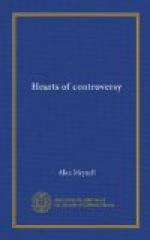If Dickens had had the education which he had not, his English could not have been better; but if he had had the usage du monde which as a young man he had not, there would have been a difference. He would not, for instance, have given us the preposterous scenes in Nicholas Nickleby in which parts are played by Lord Frederick Verisopht, Sir Mulberry Hawke, and their friends; the scene of the hero’s luncheon at a restaurant and the dreadful description of the mirrors and other splendours would not have been written. It is a very little thing to forgive to him whom we have to thank for—well, not perhaps for the “housefull of friends” for the gift of whom a stranger, often quoted, once blessed him in the street; we may not wish for Mr. Feeder, or Major Bagstock, or Mrs. Chick, or Mrs. Pipchin, or Mr. Augustus Moddle, or Mr. F.’s aunt, or Mr. Wopsle, or Mr. Pumblechook, as an inmate of our homes. Lack of knowledge of the polite world is, I say, a very little thing to forgive to him whom we thank most chiefly for showing us these interesting people just named as inmates of the comedy homes that are not ours. We thank him because they are comedy homes, and could not be ours or any man’s; that is, we thank him for his admirable art.
SWINBURNE’S LYRICAL POETRY
The makers of epigrams, of phrases, of pages—of all more or less brief judgements—assuredly waste their time when they sum up any one of all mankind; and how do they squander it when their matter is a poet! They may hardly describe him; nor shall any student’s care, or psychologist’s formula, or man-of-letters’ summary, or wit’s sentence define him. Definitions, because they must not be inexact or incomprehensive, sweep too wide, and the poet is not held within them; and out of the mere describer’s range and capture he may escape by as many doors as there are outlets from a forest. But much ready-made platitude brings about the world’s guesses at a poet, and false and flat thought lies behind its epigrams. It is not long since the general guess-work assigned melancholy, without authority, to a poet lately deceased. Real poets, it was said, are unhappy, and this was one exceptionally real. How unhappy must he, then, certainly have been! And the blessed Blake himself was incidentally cited as one of the company of depression and despair! It is, perhaps, a liking for symmetry that prompts these futile syllogisms; perhaps, also, it is the fear of human mystery.




